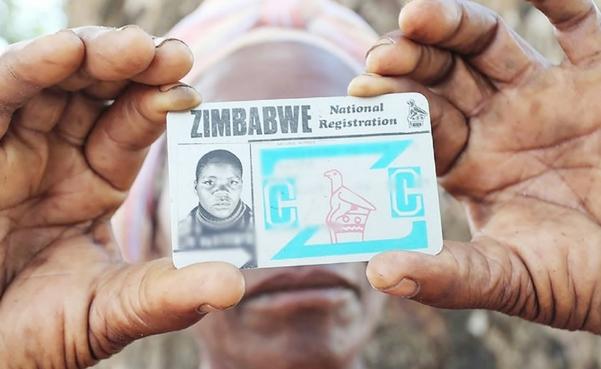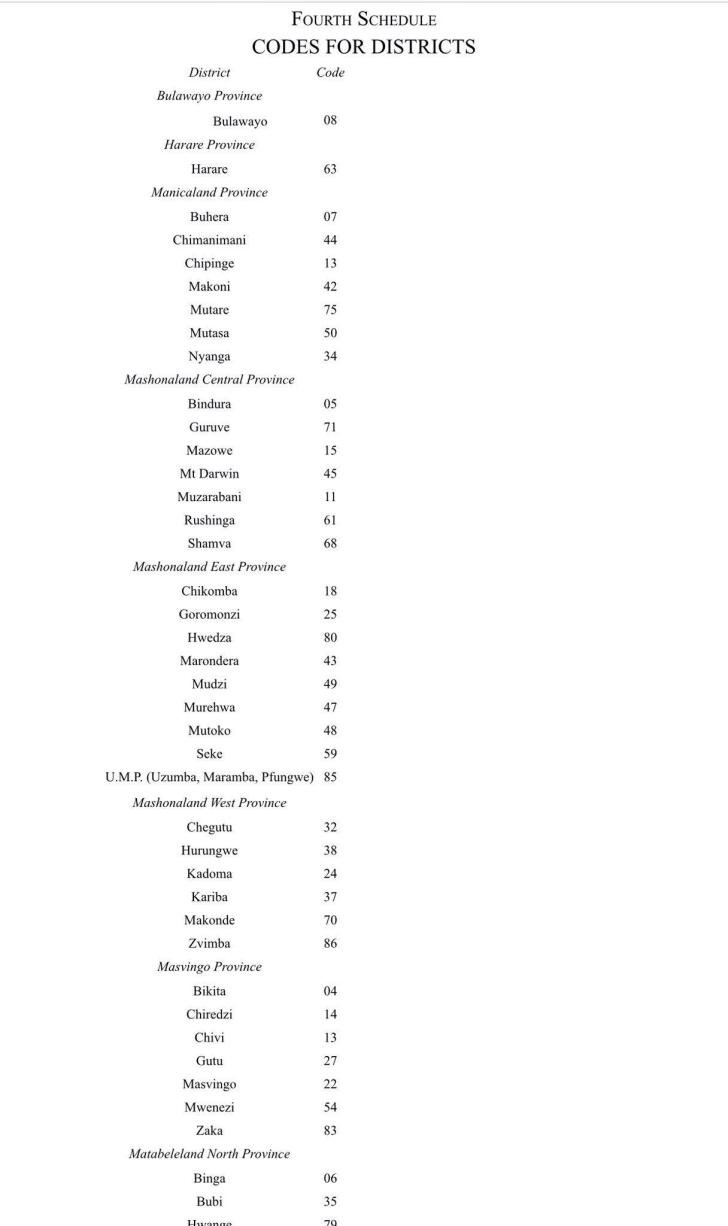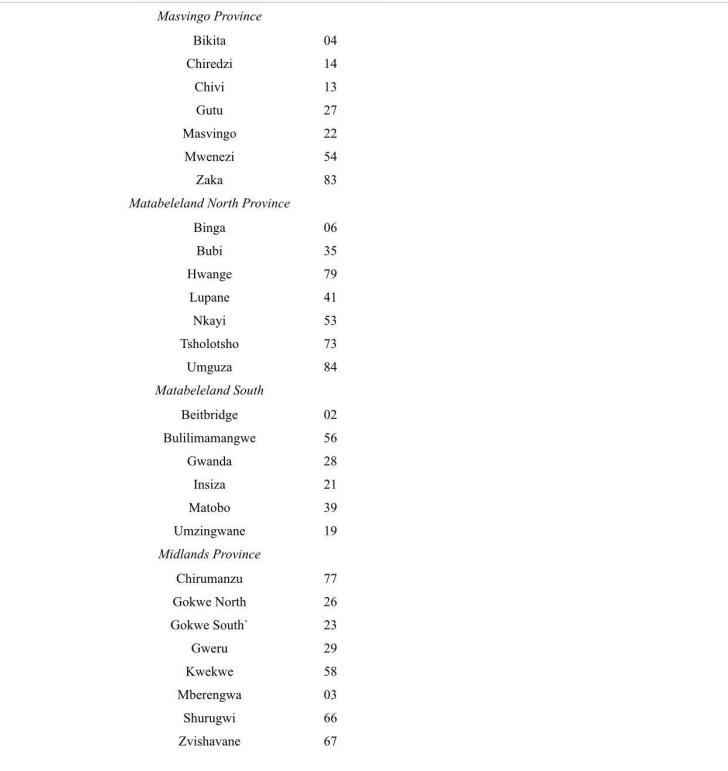News / National
Know your Zimbabwe ID number
21 Nov 2024 at 07:50hrs |
2123 Views

The Zimbabwe National ID is a critical document for citizens, serving as a means of identification, voting registration, and access to various government services. It contains coded information that not only denotes personal details but also reflects a person's district of origin and district of registration. This coding system is outlined in the country’s legislation, which assigns specific codes to different regions, provinces, and districts.
The Structure of the ID Codes
According to Rhodesia Government Notice 47 of 1977, Zimbabwe is divided into 10 administrative provinces, which are further subdivided into 64 districts and 1,970 wards. Each region, district, and ward has a corresponding code that appears on a citizen’s national ID number. For example:
Harare is assigned the code 63
Bulawayo is assigned the code 08
Mberengwa carries the code 03
Insiza has the code 21
These district codes are incorporated into the ID number, indicating both the individual's district of origin (where they come from) and their district of registration (where they were registered). While this information is useful for administrative purposes, it also carries with it significant implications.
The Subtle Control of Population Data
Although the coded data on the ID appears harmless, it was created by the colonialists to subtly control the population. The use of district codes can potentially lead to discrimination based on the information encoded within a person’s ID number. For instance, the coded district of origin can serve as a marker for ethnic or regional backgrounds, which could make individuals vulnerable to biases or unequal treatment.
This becomes more evident when the system is used to differentiate between citizens and non-citizens, as well as to classify individuals by their race or ethnic background.
Foreigners and Racial Classification
Under the current system, foreigners living in Zimbabwe are given the district of origin code 00. This code is a clear indicator that the person is not originally from Zimbabwe, which can be useful for tracking residency or immigration status. For example, an ID number for a foreigner might look like this: 12 345678 A00, with the 00 denoting that the individual is not a native citizen.
In addition to foreign nationals, individuals in Zimbabwe who are not of black African descent also receive a 00 code in their district of origin, including those of mixed race. This classification has raised concerns over racial discrimination, as it can create a divide between citizens based on race and ethnicity.
Abolition of the 00 Code
In response to criticism that the 00 district code unfairly differentiates citizens based on race, colour, or creed, the Department of Home Affairs and Cultural Affairs announced in September 2021 that the 00 code would be abolished. The decision to eliminate this code reflects an effort to promote inclusivity and equality among Zimbabwean citizens, regardless of their racial or ethnic background.
The removal of the 00 code is seen as a step toward ensuring that all Zimbabweans, regardless of race, are treated equally and that no citizen is marginalized or discriminated against based on their racial identity. The move also aims to reduce the potential for prejudice in the way people are categorized and treated by the state.


The Zimbabwe National ID is more than just an identification document—it contains coded information that reflects a person's district of origin and registration. While this system helps in organizing administrative data, it also has implications for how individuals are classified and potentially discriminated against. The recent decision to abolish the 00 code for foreigners and non-black citizens is a significant step in addressing concerns about racial discrimination and fostering equality in the country.
The Structure of the ID Codes
According to Rhodesia Government Notice 47 of 1977, Zimbabwe is divided into 10 administrative provinces, which are further subdivided into 64 districts and 1,970 wards. Each region, district, and ward has a corresponding code that appears on a citizen’s national ID number. For example:
Harare is assigned the code 63
Bulawayo is assigned the code 08
Mberengwa carries the code 03
Insiza has the code 21
These district codes are incorporated into the ID number, indicating both the individual's district of origin (where they come from) and their district of registration (where they were registered). While this information is useful for administrative purposes, it also carries with it significant implications.
The Subtle Control of Population Data
Although the coded data on the ID appears harmless, it was created by the colonialists to subtly control the population. The use of district codes can potentially lead to discrimination based on the information encoded within a person’s ID number. For instance, the coded district of origin can serve as a marker for ethnic or regional backgrounds, which could make individuals vulnerable to biases or unequal treatment.
This becomes more evident when the system is used to differentiate between citizens and non-citizens, as well as to classify individuals by their race or ethnic background.
Under the current system, foreigners living in Zimbabwe are given the district of origin code 00. This code is a clear indicator that the person is not originally from Zimbabwe, which can be useful for tracking residency or immigration status. For example, an ID number for a foreigner might look like this: 12 345678 A00, with the 00 denoting that the individual is not a native citizen.
In addition to foreign nationals, individuals in Zimbabwe who are not of black African descent also receive a 00 code in their district of origin, including those of mixed race. This classification has raised concerns over racial discrimination, as it can create a divide between citizens based on race and ethnicity.
Abolition of the 00 Code
In response to criticism that the 00 district code unfairly differentiates citizens based on race, colour, or creed, the Department of Home Affairs and Cultural Affairs announced in September 2021 that the 00 code would be abolished. The decision to eliminate this code reflects an effort to promote inclusivity and equality among Zimbabwean citizens, regardless of their racial or ethnic background.
The removal of the 00 code is seen as a step toward ensuring that all Zimbabweans, regardless of race, are treated equally and that no citizen is marginalized or discriminated against based on their racial identity. The move also aims to reduce the potential for prejudice in the way people are categorized and treated by the state.


The Zimbabwe National ID is more than just an identification document—it contains coded information that reflects a person's district of origin and registration. While this system helps in organizing administrative data, it also has implications for how individuals are classified and potentially discriminated against. The recent decision to abolish the 00 code for foreigners and non-black citizens is a significant step in addressing concerns about racial discrimination and fostering equality in the country.
Source - byo24news
Join the discussion
Loading comments…








































